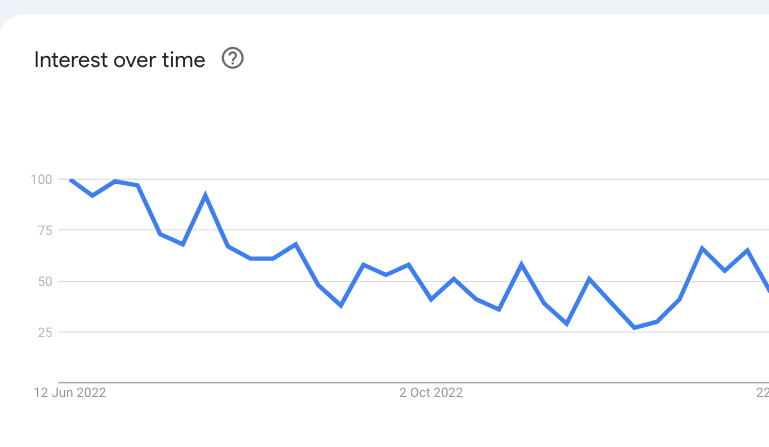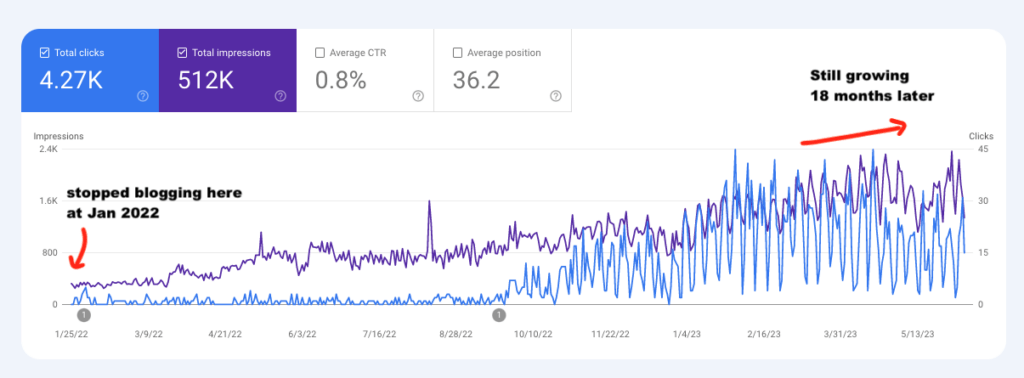Almost every blogging tutorial mentions how important it is to stay consistent and publish blog posts every day.
The main fear is that inconsistency, such as long breaks could impact your blog traffic.
In this post, I show you what actually happens to your blogs if you take a break for over a month.
To tease it a bit more, I’ll show you the results of having one blog with a 6-month break and another one with an 18-month break.
Let’s jump into it!

Consistency
Writing every day is one of the best advice to give to a blogger.
But that’s not because Google or your audience would care.
It’s just to establish a healthy habit of working hard towards your goals. The more you write, the higher the chances for success.
For me, it took about 250 blog posts and closer to a year of full-time work (for free) to start making money from my blogs.
What Happens When You Stop Blogging
So the burning question is what happens to your blog if you stop blogging for a more extended period of time?
Most of the time, your traffic will remain the same.
As a matter of fact, if your traffic comes down during a break, it’s most likely caused by something else than inactivity.
But Why?
Google and other search engines don’t care about consistency, in my experience.
All they care about is value.
As long as your blog post is the best piece of content around that topic, it will remain high in the rankings.
This can mean years.
But it could also mean days if the topic is really competitive.
A fun way to consider it is this: A blog post that ranks high needs to break a record—a record of being the best post about that topic.

As long as the blog post holds that record, it will hold its position in the rankings (more or less).
If someone breaks your record, they might steal your spot.
Of course, this assumption is naive because Google and other search engines change their ranking algorithms daily. Thus, they change the “rules” of the game every day. This can cause fluctuations in rankings, even if you own the best post.
But this is more or less how it works.
So if you write the best blog post about something like “How to calculate Pythagorean theorem”, it might rank high for years even if you completely ditched your blog.
But if you write a post about “Weather trends for the next 7 days”, you’d better not only keep the blog relevant but also update that particular post every day.
Case Study
Let’s take a closer look at my experience of taking long breaks on a couple of my blogs.
Site #1: 5-6 Months Off
Ok, let me show you what happened when I and my mate took a 5-month hiatus from our niche site.

As you can see, the clicks and impressions just trended upward the whole time.
As a matter of fact, the niche is seasonal, so the graph should have a downward trend during this period.
This is what we expected to see during the break:

But instead, the site kept growing and improving its position in rankings.
Site #2: 18 Months Off
As another even cooler example, I have another blog that I started with my mates and ditched after 15 posts almost 1.5 years ago.
Here’s what the stats of an 18-month inactive blog look like:

The site has trended upwards for 1.5 years. Yet we did absolutely nothing to the site.
This not only shows that a small break won’t do anything but also reveals how important it is to stay patient.
Before a Break…
Now, is there something you need to do before a break?
For 99.9% of you, you can just silently walk away.
If you happen to have a blog where you know a big chunk of the audience expects a daily/weekly post, just communicate your break to them. Or just schedule a bunch of automated posts during your break.
But most of the time these days, blog traffic comes from search engines. A big chunk of your blog visitors are one-timers and don’t care two bit about your breaks or routines.
Tip: Don’t Take Breaks
Even though a long break will most likely not impact your rankings, I don’t recommend doing it unless you have to.
This is because blogging is, after all, a business. The more time off you take, the greater the gap your competitors will gain on you.
It still requires a ton of hard work to succeed as a blogger.
I recommend writing a blog post every day.
Wrapping Up
Have you taken a break? How has it impacted your blog’s performance? Let me know in the comments! 🙂
Thanks for reading. Happy writing!
